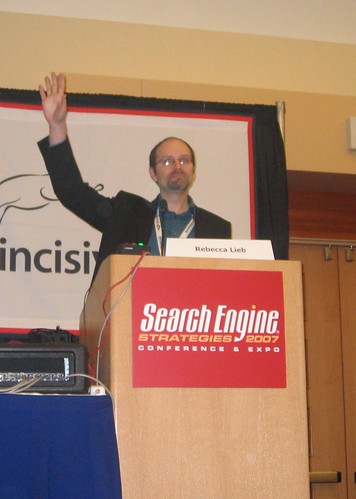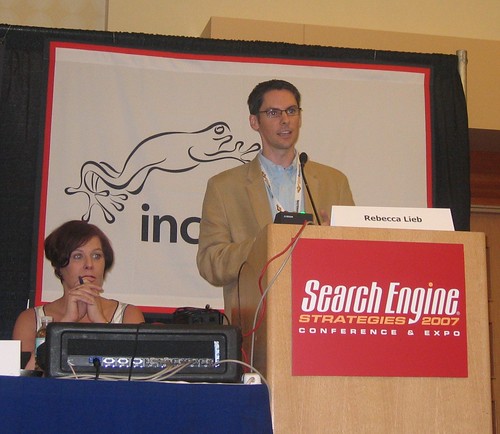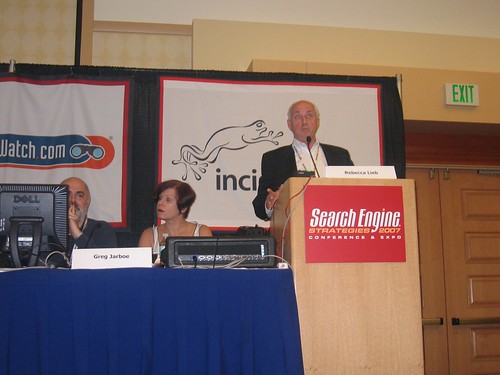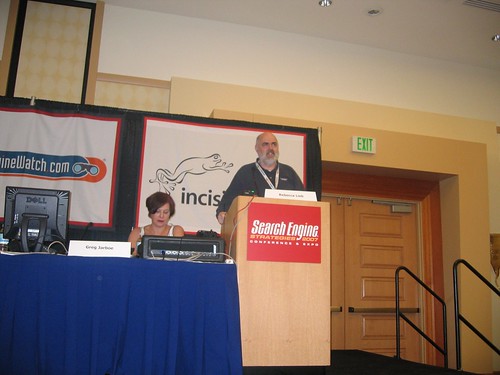Not yet running a blog? Not syndicating your content through web feeds? Then you're missing out on an important area that can help your overall SEO efforts. Learn more about the unique advantages blogs and feeds offer to search engine optimization. Moderator:
* Rebecca Lieb, Editor-in-Chief, The ClickZ Network
Speakers:
* Greg Jarboe, President and Co-Founder, SEO-PR * Stephan Spencer, Founder and President, Netconcepts, LLC * Rick Klau, Strategic Partner Development, Google * Doug Hay, Principal & CEO, Expansion Plus Inc.
Rebecca starts talking, and I realize that the sound system in this room is really bad. This reminds me of what Lisa wrote about at SMX. It sounds like she's talking into an air conditioner. I hope I can hear the rest of the speakers.
Stephan is much more audible. Maybe Rebecca is just shy.
Since everyone knows what RSS is about, Stephan skips his slides about feeds and talks about optimizing your RSS feeds. - Full text feeds, not summaries. It has rich HTML in there which is really important. (Rebecca just moved the mic away from Stephan. Now he's not as loud but you can still hear him. Score.) - You want to have as many items in the RSS feed as possible - 20 or more. The default is 10 but you should have more for the syndicators. - Offer multiple feeds: category specific, latest comments, comments by post, tag feed. - Optimize in terms of keywords in the item title and site title - Have a compelling description - Don't put tracking codes into URLs (e.g. &source=RSS). That's bad for splitting PageRank. - An RSS feed that contains enclosures (i.e. podcasts) can get into additional RSS directories. Have a good description - not "Just another WordPress blog."
Optimizing your blog: - Rejig your internal hierarchical linking structure. People rely too much on the date based archives. Dates are horrible for the anchor text. The anchor text is as suboptimal as you can get. It's all bad. Nofollow those date-based archives or comments. * Tag clouds and tag pages (UltimateTagWarrior plugin). Add keywords in your internal links. Tag clouds are very powerful. You can specify the maximum. * Related posts (Contextual Related Posts plugin). Once you have tags on your page, you want related pages to be linked. Related tag pages and tag conjunction pages are very helpful. * Title tags: SEO Title Tag plugin for Wordpress. It is a free plugin written by Stephan Spencer. It lets you assign unique title tags to every single post, category page, etc. * Top 10 posts (Popularity Posts plugin) * Pick a great plugin. * Next and Previous posts - Build inbound links * Add Technorati tags to your posts (must claim your blog first) * Get onto bloggers' blogrolls * Trackbacks and comments won't help with linkgain. * Use "Sticky" posts - you can set the keyword theme consistent and stable. Always appear at the top of the page. It's a way to add keyword rcih intro copy to a caetegory page or tag page. An example of this is the Adhesive Plugin. The next person who is speaking is Rick Klau from Google. He's a former Feedburner employee but we know that was acquired by Google.
What's new: - Syndication is increasingly popular - Social networks are encouraging feed distribution. You - Feedburner's "pro" features are now free (TotalStats and MyBrand) - Yahoo Pipes makes RSS more customizable. You can mix and match content from many RSS feeds. - Sitemaps support feeds. You can tell engines where your content is.
A few things specific to Feedburner that you can take advantage of are: - When feed items are rendered in the aggregators, you know about it. You know that people are reading your feed content. That makes it easier for you to determine the impact of your feed. You can find out link clicks. - MyBrand - you can map a CNAME to feeds.feedburner.com (use feeds.yourdomain.com instead of feedburner.com) but you need DNS know-how. - You can get detailed visibility. Know which items generate activity. - As Stephen said, full text is better than partial text. Big text on the slide: "It's the link, stupid." I think that more than anything the reasons that publishers want to look at full feed vs. partial feed is because they want people to show the content. It has nothing to do with monetization.
Best practices for Search Engines - Noindex: if you prefer to keep this out of the search index, Google and Yahoo support this. - Robots.txt - Auto-discovery "advertises" your feed's availability to browsers and bots. This one line of code tells everybody visitor where your feed is so you can subscribe to it with one click. You can also know which services know you (which bots have accessed your site). - If you're producing a podcast, please include show notes. Search engines love those.
Facebook lets users import notes so you should leverage social networks for distribution.
Doug Hay speaks next. (At this point, I do think Rebecca is just shy. Doug is quite audible as well.)
Google wants to see content and escalating amounts of content. From a marketer's point of view, you want to analyze the utilization. RSS is great on a blog. RSS feeds outside the blog platform are useful too, and I'll talk about that.
Any marketer has to have a strategy. RSS is a good strategy: - Increase the rate of change on your pages. Add more content. - Add more optimized content through RSS feeds - Reach new niche markets - Have ability to drive more qualified traffic to your site - Have the ability to provide more inbound links.
An example: you can deploy RSS for text, video, or audio, or all 3 combined. With video/audio, provide text because search engines can't understand video and text.
Applications: News articles Product information Customer education Destination information
In addition to syndicating the content, add social media tagging.
Case study: Vision Media. They have an online/offline publication in history, philosophy, ethics, morality, and so on. Their pages have been revamped with RSS. Before RSS was implemented, they weren't in the first 1000. Subsequently, they ended up with top 10 rankings (4, 3, 10, 3). Through the syndication process, Reuters in Africa picked it up. Social networks got picked up by Digg, had 295 Diggs, and got over 5000 visitors to the site.
Last up is Greg Jarboe.
Everybody has a blog - 98 million people do. There are only 100,000,000 websites. Soon there will be more blogs than websites. If you don't have one, it's too late.
Greg wants to show something interesting: you don't need to have a blog to benefit from blogging. He shows an example of a guy who had great traffic. People looking at popular search terms - look at Google trends and blog about it becasue chances are, your competitors have not.
Using a tool called Buzzlogic, we mapped 40 influential bloggers and journalists who started joining in the conversation. Fifteen wrote about the stories and doubled about the traffic to the site. Getting influential bloggers to write about something can increase your record subscriptions. Blogger outreach brings more sales.





